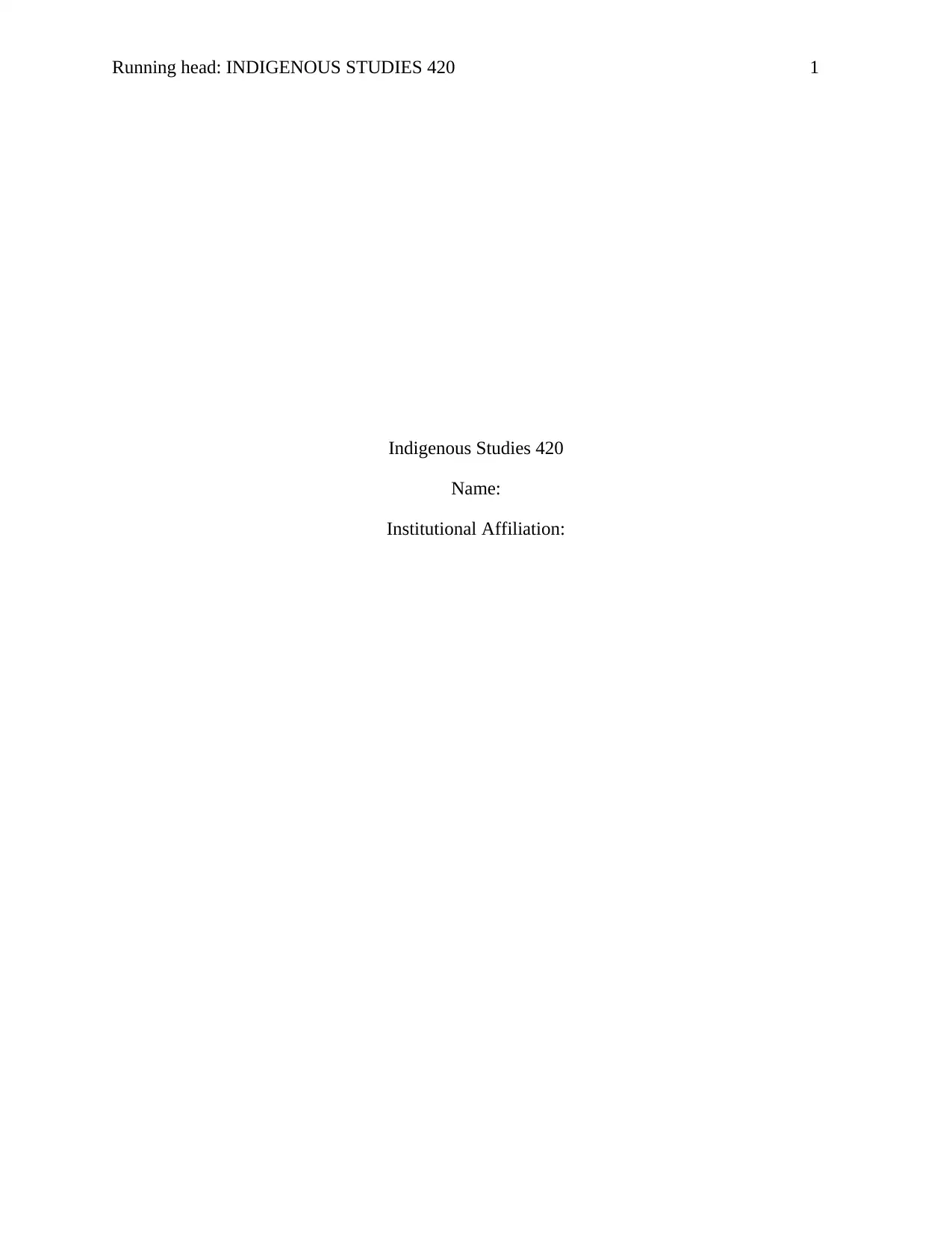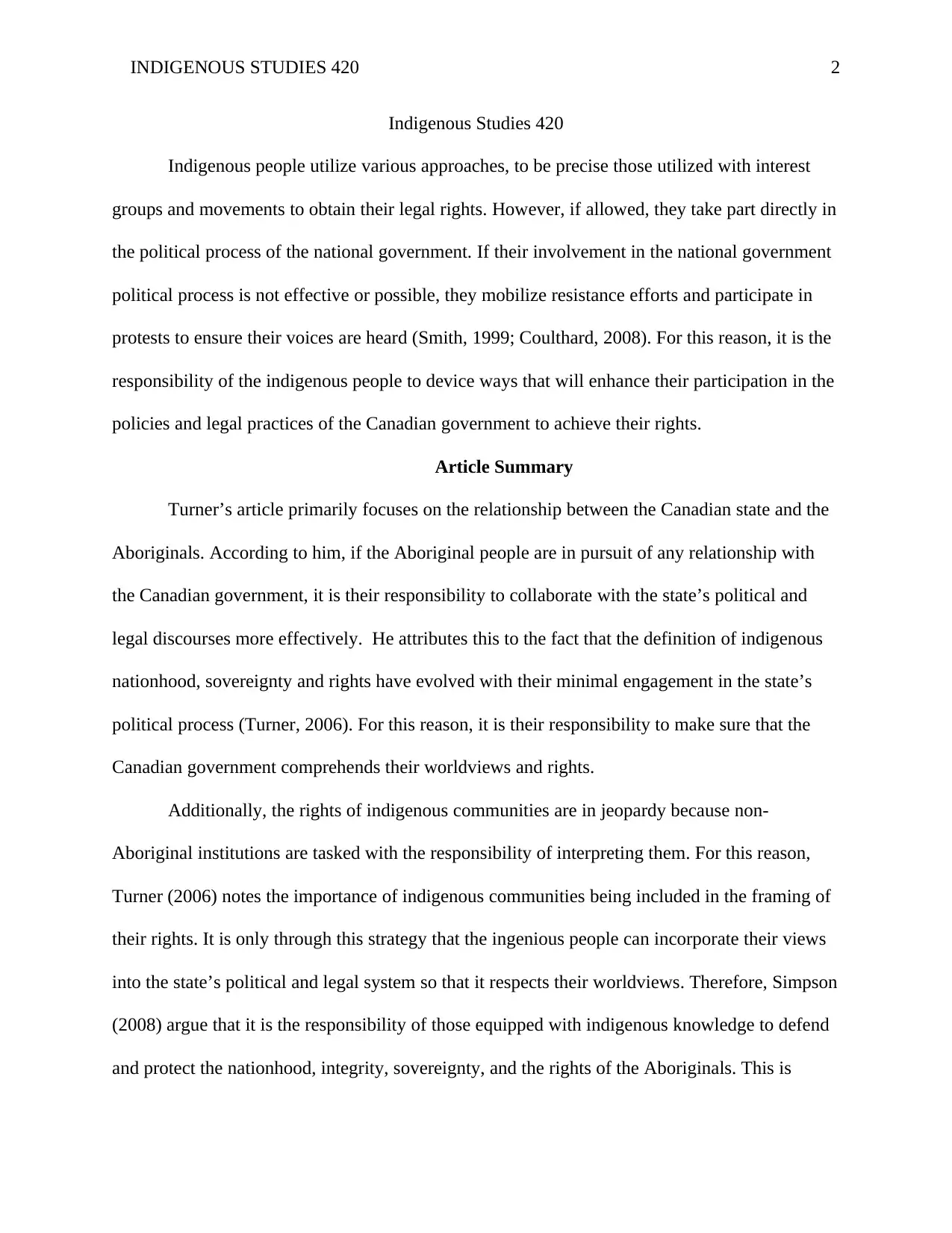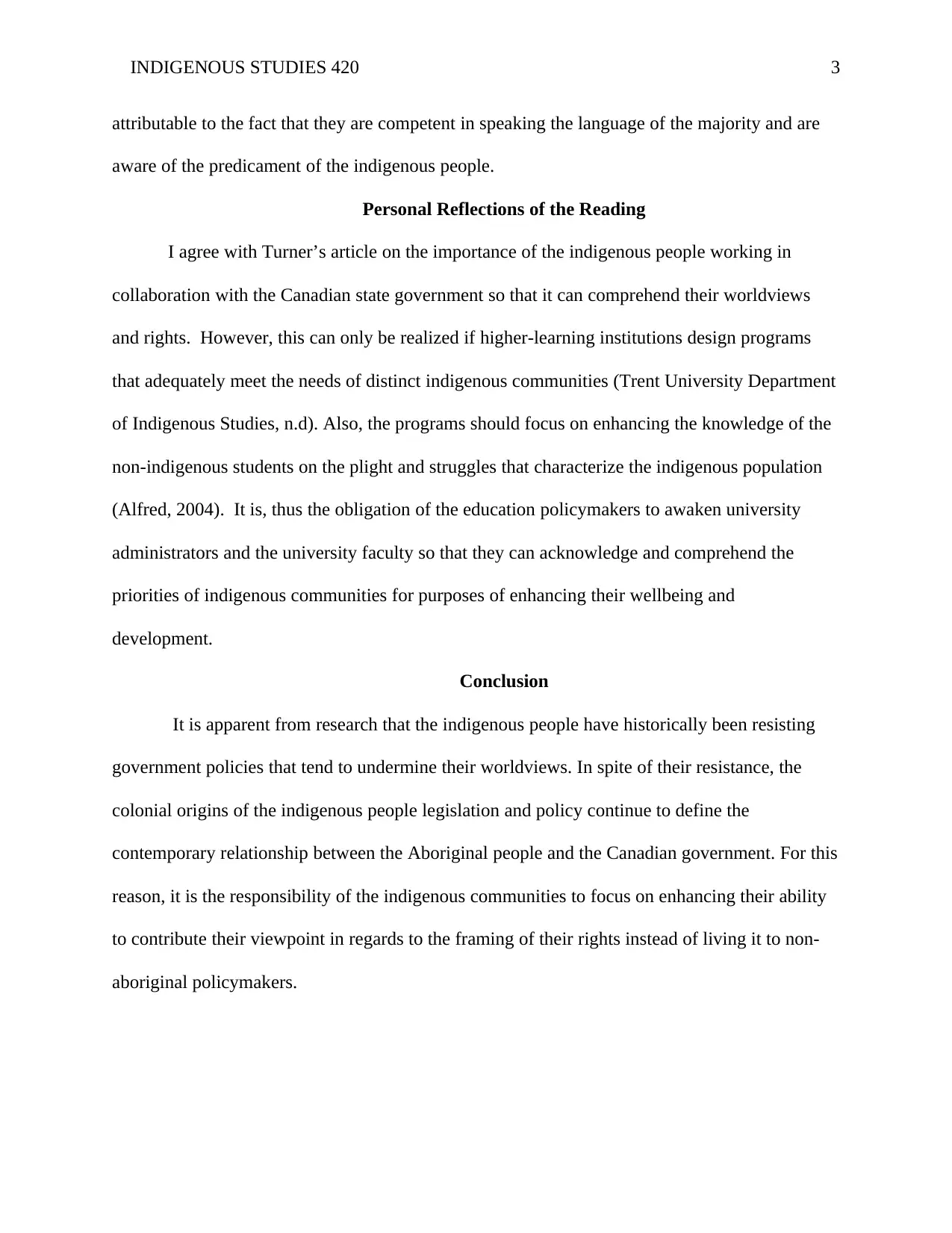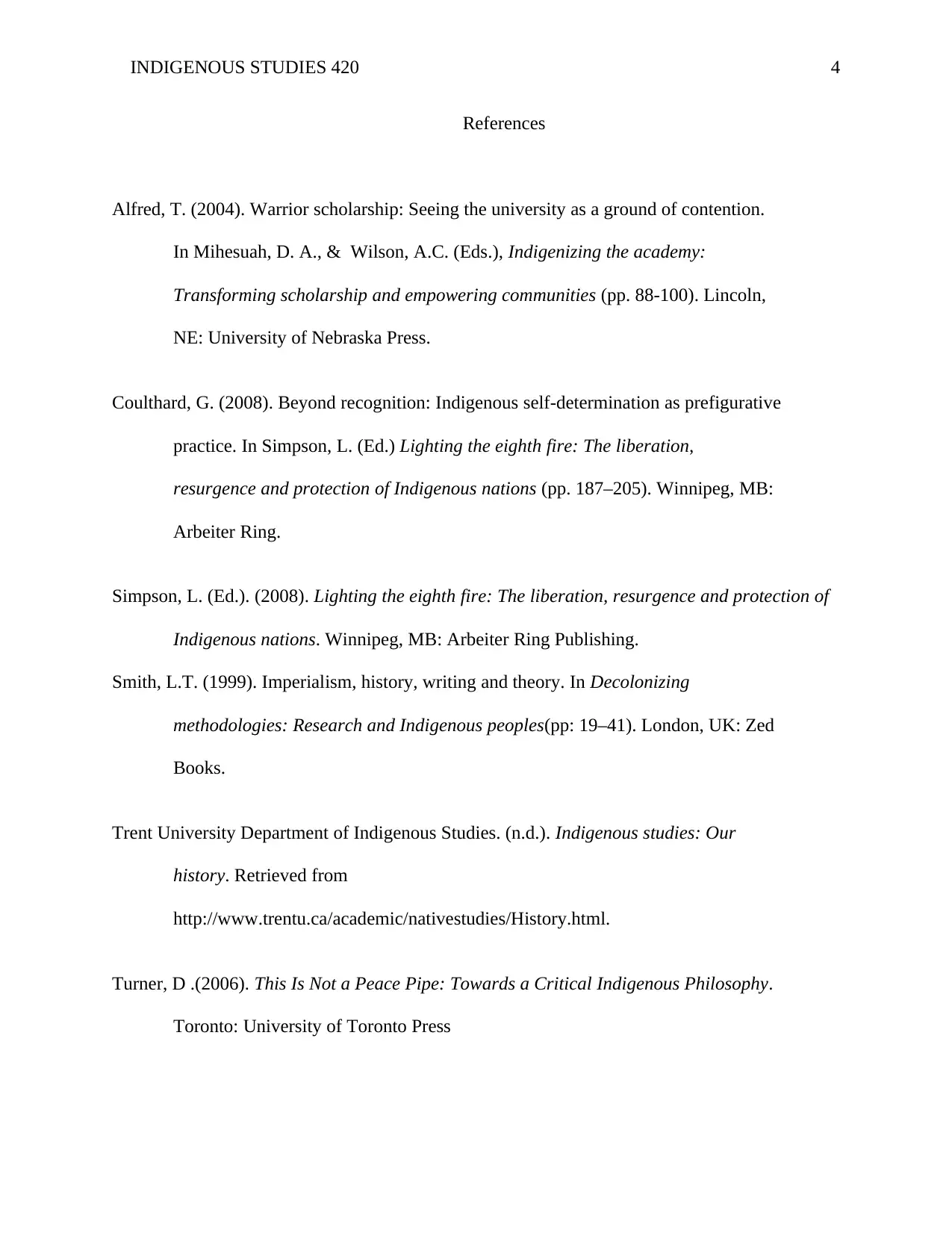Response Paper: Indigenous Studies 420 Article Summary and Reflection
VerifiedAdded on 2023/01/19
|4
|859
|83
Report
AI Summary
This response paper for Indigenous Studies 420 summarizes an article focusing on the relationship between the Canadian state and Aboriginal peoples. The paper highlights the importance of Indigenous communities collaborating with the Canadian government to ensure their worldviews and rights are understood. It discusses how the framing of Indigenous rights by non-Aboriginal institutions jeopardizes these rights and emphasizes the need for Indigenous involvement in defining their rights. The paper also reflects on the importance of higher-learning institutions designing programs that meet the needs of Indigenous communities and the role of education policymakers in acknowledging their priorities. The conclusion reiterates the need for Indigenous communities to contribute their viewpoints to the framing of their rights to overcome historical resistance and colonial legacies.

Running head: INDIGENOUS STUDIES 420 1
Indigenous Studies 420
Name:
Institutional Affiliation:
Indigenous Studies 420
Name:
Institutional Affiliation:
Paraphrase This Document
Need a fresh take? Get an instant paraphrase of this document with our AI Paraphraser

INDIGENOUS STUDIES 420 2
Indigenous Studies 420
Indigenous people utilize various approaches, to be precise those utilized with interest
groups and movements to obtain their legal rights. However, if allowed, they take part directly in
the political process of the national government. If their involvement in the national government
political process is not effective or possible, they mobilize resistance efforts and participate in
protests to ensure their voices are heard (Smith, 1999; Coulthard, 2008). For this reason, it is the
responsibility of the indigenous people to device ways that will enhance their participation in the
policies and legal practices of the Canadian government to achieve their rights.
Article Summary
Turner’s article primarily focuses on the relationship between the Canadian state and the
Aboriginals. According to him, if the Aboriginal people are in pursuit of any relationship with
the Canadian government, it is their responsibility to collaborate with the state’s political and
legal discourses more effectively. He attributes this to the fact that the definition of indigenous
nationhood, sovereignty and rights have evolved with their minimal engagement in the state’s
political process (Turner, 2006). For this reason, it is their responsibility to make sure that the
Canadian government comprehends their worldviews and rights.
Additionally, the rights of indigenous communities are in jeopardy because non-
Aboriginal institutions are tasked with the responsibility of interpreting them. For this reason,
Turner (2006) notes the importance of indigenous communities being included in the framing of
their rights. It is only through this strategy that the ingenious people can incorporate their views
into the state’s political and legal system so that it respects their worldviews. Therefore, Simpson
(2008) argue that it is the responsibility of those equipped with indigenous knowledge to defend
and protect the nationhood, integrity, sovereignty, and the rights of the Aboriginals. This is
Indigenous Studies 420
Indigenous people utilize various approaches, to be precise those utilized with interest
groups and movements to obtain their legal rights. However, if allowed, they take part directly in
the political process of the national government. If their involvement in the national government
political process is not effective or possible, they mobilize resistance efforts and participate in
protests to ensure their voices are heard (Smith, 1999; Coulthard, 2008). For this reason, it is the
responsibility of the indigenous people to device ways that will enhance their participation in the
policies and legal practices of the Canadian government to achieve their rights.
Article Summary
Turner’s article primarily focuses on the relationship between the Canadian state and the
Aboriginals. According to him, if the Aboriginal people are in pursuit of any relationship with
the Canadian government, it is their responsibility to collaborate with the state’s political and
legal discourses more effectively. He attributes this to the fact that the definition of indigenous
nationhood, sovereignty and rights have evolved with their minimal engagement in the state’s
political process (Turner, 2006). For this reason, it is their responsibility to make sure that the
Canadian government comprehends their worldviews and rights.
Additionally, the rights of indigenous communities are in jeopardy because non-
Aboriginal institutions are tasked with the responsibility of interpreting them. For this reason,
Turner (2006) notes the importance of indigenous communities being included in the framing of
their rights. It is only through this strategy that the ingenious people can incorporate their views
into the state’s political and legal system so that it respects their worldviews. Therefore, Simpson
(2008) argue that it is the responsibility of those equipped with indigenous knowledge to defend
and protect the nationhood, integrity, sovereignty, and the rights of the Aboriginals. This is

INDIGENOUS STUDIES 420 3
attributable to the fact that they are competent in speaking the language of the majority and are
aware of the predicament of the indigenous people.
Personal Reflections of the Reading
I agree with Turner’s article on the importance of the indigenous people working in
collaboration with the Canadian state government so that it can comprehend their worldviews
and rights. However, this can only be realized if higher-learning institutions design programs
that adequately meet the needs of distinct indigenous communities (Trent University Department
of Indigenous Studies, n.d). Also, the programs should focus on enhancing the knowledge of the
non-indigenous students on the plight and struggles that characterize the indigenous population
(Alfred, 2004). It is, thus the obligation of the education policymakers to awaken university
administrators and the university faculty so that they can acknowledge and comprehend the
priorities of indigenous communities for purposes of enhancing their wellbeing and
development.
Conclusion
It is apparent from research that the indigenous people have historically been resisting
government policies that tend to undermine their worldviews. In spite of their resistance, the
colonial origins of the indigenous people legislation and policy continue to define the
contemporary relationship between the Aboriginal people and the Canadian government. For this
reason, it is the responsibility of the indigenous communities to focus on enhancing their ability
to contribute their viewpoint in regards to the framing of their rights instead of living it to non-
aboriginal policymakers.
attributable to the fact that they are competent in speaking the language of the majority and are
aware of the predicament of the indigenous people.
Personal Reflections of the Reading
I agree with Turner’s article on the importance of the indigenous people working in
collaboration with the Canadian state government so that it can comprehend their worldviews
and rights. However, this can only be realized if higher-learning institutions design programs
that adequately meet the needs of distinct indigenous communities (Trent University Department
of Indigenous Studies, n.d). Also, the programs should focus on enhancing the knowledge of the
non-indigenous students on the plight and struggles that characterize the indigenous population
(Alfred, 2004). It is, thus the obligation of the education policymakers to awaken university
administrators and the university faculty so that they can acknowledge and comprehend the
priorities of indigenous communities for purposes of enhancing their wellbeing and
development.
Conclusion
It is apparent from research that the indigenous people have historically been resisting
government policies that tend to undermine their worldviews. In spite of their resistance, the
colonial origins of the indigenous people legislation and policy continue to define the
contemporary relationship between the Aboriginal people and the Canadian government. For this
reason, it is the responsibility of the indigenous communities to focus on enhancing their ability
to contribute their viewpoint in regards to the framing of their rights instead of living it to non-
aboriginal policymakers.
⊘ This is a preview!⊘
Do you want full access?
Subscribe today to unlock all pages.

Trusted by 1+ million students worldwide

INDIGENOUS STUDIES 420 4
References
Alfred, T. (2004). Warrior scholarship: Seeing the university as a ground of contention.
In Mihesuah, D. A., & Wilson, A.C. (Eds.), Indigenizing the academy:
Transforming scholarship and empowering communities (pp. 88-100). Lincoln,
NE: University of Nebraska Press.
Coulthard, G. (2008). Beyond recognition: Indigenous self-determination as prefigurative
practice. In Simpson, L. (Ed.) Lighting the eighth fire: The liberation,
resurgence and protection of Indigenous nations (pp. 187–205). Winnipeg, MB:
Arbeiter Ring.
Simpson, L. (Ed.). (2008). Lighting the eighth fire: The liberation, resurgence and protection of
Indigenous nations. Winnipeg, MB: Arbeiter Ring Publishing.
Smith, L.T. (1999). Imperialism, history, writing and theory. In Decolonizing
methodologies: Research and Indigenous peoples(pp: 19–41). London, UK: Zed
Books.
Trent University Department of Indigenous Studies. (n.d.). Indigenous studies: Our
history. Retrieved from
http://www.trentu.ca/academic/nativestudies/History.html.
Turner, D .(2006). This Is Not a Peace Pipe: Towards a Critical Indigenous Philosophy.
Toronto: University of Toronto Press
References
Alfred, T. (2004). Warrior scholarship: Seeing the university as a ground of contention.
In Mihesuah, D. A., & Wilson, A.C. (Eds.), Indigenizing the academy:
Transforming scholarship and empowering communities (pp. 88-100). Lincoln,
NE: University of Nebraska Press.
Coulthard, G. (2008). Beyond recognition: Indigenous self-determination as prefigurative
practice. In Simpson, L. (Ed.) Lighting the eighth fire: The liberation,
resurgence and protection of Indigenous nations (pp. 187–205). Winnipeg, MB:
Arbeiter Ring.
Simpson, L. (Ed.). (2008). Lighting the eighth fire: The liberation, resurgence and protection of
Indigenous nations. Winnipeg, MB: Arbeiter Ring Publishing.
Smith, L.T. (1999). Imperialism, history, writing and theory. In Decolonizing
methodologies: Research and Indigenous peoples(pp: 19–41). London, UK: Zed
Books.
Trent University Department of Indigenous Studies. (n.d.). Indigenous studies: Our
history. Retrieved from
http://www.trentu.ca/academic/nativestudies/History.html.
Turner, D .(2006). This Is Not a Peace Pipe: Towards a Critical Indigenous Philosophy.
Toronto: University of Toronto Press
1 out of 4
Related Documents
Your All-in-One AI-Powered Toolkit for Academic Success.
+13062052269
info@desklib.com
Available 24*7 on WhatsApp / Email
![[object Object]](/_next/static/media/star-bottom.7253800d.svg)
Unlock your academic potential
Copyright © 2020–2026 A2Z Services. All Rights Reserved. Developed and managed by ZUCOL.




